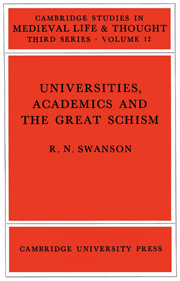Book contents
- Frontmatter
- Contents
- Maps
- Preface
- Abbreviations
- 1 The rival obediences, 1378–1409
- 2 The rival obediences, 1409–1418
- 3 The universities of Europe, 1378–1418
- Introduction
- 1 THE CONTEXT
- 2 A MATTER OF LOYALTY
- 3 DE SCHISMATE EXTINGUENDO
- 4 A BREATHING SPACE
- 5 DE SUBTRACTIONE OBEDIENTIE I
- 6 DE SUBTRACTIONE OBEDIENTIE II
- 7 DE RESTITUTIONE OBEDIENTIE
- 8 DE MATERIA CONCILII GENERALIS
- 9 HAEC SANCTA SYNODUS …
- 10 CONCLUSION
- APPENDIX 1 Notes on some academic personalities
- APPENDIX 2 University foundations, 1378–1418
- Notes on manuscripts cited
- Bibliography of works cited
- Index
APPENDIX 1 - Notes on some academic personalities
Published online by Cambridge University Press: 27 October 2009
- Frontmatter
- Contents
- Maps
- Preface
- Abbreviations
- 1 The rival obediences, 1378–1409
- 2 The rival obediences, 1409–1418
- 3 The universities of Europe, 1378–1418
- Introduction
- 1 THE CONTEXT
- 2 A MATTER OF LOYALTY
- 3 DE SCHISMATE EXTINGUENDO
- 4 A BREATHING SPACE
- 5 DE SUBTRACTIONE OBEDIENTIE I
- 6 DE SUBTRACTIONE OBEDIENTIE II
- 7 DE RESTITUTIONE OBEDIENTIE
- 8 DE MATERIA CONCILII GENERALIS
- 9 HAEC SANCTA SYNODUS …
- 10 CONCLUSION
- APPENDIX 1 Notes on some academic personalities
- APPENDIX 2 University foundations, 1378–1418
- Notes on manuscripts cited
- Bibliography of works cited
- Index
Summary
The following notes give brief details of the academic careers of some of the scholars involved in the university debates on the great schism. For several of the participants the available biographical data is limited; for others (particularly the French) there is a mass of information. I have restricted the list to those who feature most prominently in the course of the book.
PIERRE D'AILLY (1350–1420)
A member of the University of Paris throughout his academic career, becoming chancellor during the years 1389–95, d'Ailly had barely begun his theological studies when the schism broke out. In the early years of the dispute he wrote extensively on the issue, his most important contributions at this point being the tract Utrum indoctus in jure divino posset juste praeesse in ecclesiae regno and the Epistola diaboli Leviathan. He withdrew from the university to Noyon in 1381, returning in 1383. In 1395 Benedict XIII appointed him Bishop of Le Puy (exchanged for Cambrai in 1397). In the successive councils of the French church he defended the pope against his accusers, thereby acquiring several enemies. During the subtraction of obedience from the pope (1398–1403) he was one of the leaders of the restitutionist party, although absent from the university for much of the time at Cambrai. In 1403 he completed his most important academic contribution to the debates, the De materia concilii generalis.
- Type
- Chapter
- Information
- Universities, Academics and the Great Schism , pp. 209 - 215Publisher: Cambridge University PressPrint publication year: 1979

